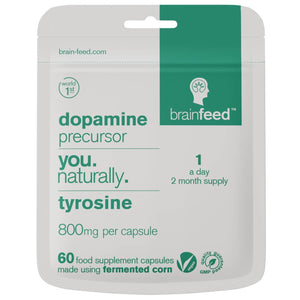Master your motivation: dopamine’s function and benefits explained
filter
Have you ever heard of the happiness chemicals? Your reward and pleasure chemical dopamine is one of them. Dopamine is a brain messenger that drives motivation, pleasure, and reward in the brain, influencing your behaviour. First discovered back in 1910, it took around 40 years before a British researcher Kathleen Montagu showed that dopamine occurred in the brain by itself. This paved the way for a series of studies by Swedish neuropharmacologist Arvid Carlsson which demonstrated that dopamine is an important brain messenger, a finding that would earn him a Nobel prize[1 Trusted Source 2022 - Current Biology Evidence review Dopamine ] . Let’s see what is dopamine, what does it do, and how you can increase your dopamine levels safely.
Table of Contents
- What does dopamine do to a person?
- Where and how is dopamine produced?
- What is dopamine's function?
What does dopamine do to a person?
Dopamine provides you with feelings of pleasure, motivation, and reward, helping you reinforce behaviours that provide you with joy. Where is dopamine found naturally? Dopamine is found naturally in the brain, as well as in plants and most animals.
What is the main role of dopamine in the brain?
The role of dopamine in the brain is as a brain messenger involved in the brain's reward and pleasure centres[2 Trusted Source 2021 - Journal of Biomedical Science Evidence review Dopamine, behavior, and addiction ] . Dopamine’s function lies in reinforcing rewarding behaviours and increasing the desire and drive to seek out those rewards. Consequently, dopamine serves as an indispensable motivational force. You can read about the 10 facts about dopamine if you want to know more
Which makes you happy - serotonin or dopamine?
Dopamine makes you feel pleasure and motivates you, while serotonin regulates mood. Both dopamine and serotonin are part of the happiness chemicals hence why their roles get mixed up so often. Serotonin is your feel-good chemical. Dopamine, on the other hand, helps you reap pleasurable feelings when practising enjoyable activities. It also drives you to keep on doing what you’re doing, so you can experience more pleasure as a reward.
Where and how is dopamine produced?
Dopamine is abundant in the lower middle part of the brain where it’s produced from its building block tyrosine. Where is dopamine made? The dopamine involved in the reward and pleasure centre is mostly made in a group of brain cells that form a small bean-like structure at the start of the brainstem. There, the building block of dopamine tyrosine is transformed into dopamine. Let’s take a look at how to increase dopamine naturally with dopamine brain foods.
What foods increase dopamine?
A dopamine diet contains tyrosine-rich foods like soy, dairy products and meat which can increase dopamine levels. Here are some dopamine-enhancing foods that you can add to your diet[3 Trusted Source My Food Data Database sourced from the USDA Food Data Central Foods Highest in Tyrosine ] .
|
Food (per 100 g) |
Tyrosine content (mg) |
|
Parmesan cheese |
2319 |
|
Dry roasted soybeans |
1497 |
|
Roast beef |
1397 |
|
Dried parsley |
1159 |
|
Hard-boiled eggs |
513 |
brain feed developed the world’s 1st natural 800mg tyrosine capsule from fermented corn. New customers can get 15% off by using the code ‘NEW15’ at checkout.
What is dopamine's function?
Dopamine fuels your drive and motivation while also paving the way for your decision-making, self-discipline and mindset. All of that supports you on your path to a successful life as dopamine benefits are key to continually seeking new challenges[4 Trusted Source 2004 - Nature Reviews Neuroscience Evidence review Dopamine, learning and motivation ] . Dopamine surges when you anticipate rewards, experience something novel or exciting, or achieve goals. This chemical rush of pleasure keeps you feeling energised and eager to repeat the behaviour. A study even showed that dopamine levels spike in the early stages of pursuing a new goal or activity[5 Trusted Source 2010 - Neuron Evidence review Dopamine in Motivational Control: Rewarding, Aversive, and Alerting ] .
Does dopamine help with motivation?
Yes, dopamine and motivation are closely connected as dopamine supports you in your pursuit of rewarding feelings. Dopamine creates a feedback loop that reinforces behaviours leading to positive experiences, encouraging us to repeat them. This motivational drive is essential to achieve your goals, as it propels you to take action and persevere towards your objectives[6 Trusted Source 2020 - Nature Neuroscience Human clinical study Acute social isolation evokes midbrain craving responses similar to hunger ] ,[7 Trusted Source 2010 - Frontiers in Behavioral Neuroscience Evidence review The rewarding nature of social interactions ] . Let’s imagine you want to start eating healthy. Dopamine first pushes you to search for healthy and delicious recipes. After you make the meals, you’re rewarded with enjoying how tasty they are. Dopamine will create a loop that says healthy meals are tasty meals, supporting you in continuing eating healthy meals. This kind of experience also supports the cultivation of a growth mindset, as you now believe you can develop your skills through effort[8 Trusted Source 2019 - Nature Human clinical study A national experiment reveals where a growth mindset improves achievement ] . All in all, dopamine influences your motivation which also affects the decision-making process, your mindset and your self-discipline[9 Trusted Source 2019 - Nature Animal study Dissociable dopamine dynamics for learning and motivation ] ,[10 Trusted Source 2018 - Nature Neuroscience Evidence review What does dopamine mean? ] .
What happens to dopamine during sex?
During sex, dopamine levels increase significantly, contributing to feelings of pleasure and reward and providing you with the mental health benefits of sex. Every time you orgasm, your brain becomes flooded with your reward and pleasure chemical dopamine, and sex is considered a pleasurable activity by your brain, wanting more of it[11 Trusted Source 2003 - The Journal of Neuroscience Human clinical study Brain Activation during Human Male Ejaculation ] . While orgasming, you feel an intense pleasure which - based on an older study - looks just like a heroin rush to the brain, producing intense feelings of well-being[11 Trusted Source 2003 - The Journal of Neuroscience Human clinical study Brain Activation during Human Male Ejaculation ] . Because sex feels so good, your reward chemical makes sure you desire more sexual activity, erection and ejaculation. It’s like dopamine is keeping you in a constant reward loop.
Is ADHD high or low dopamine?
ADHD has been widely associated with low levels of dopamine in the brain all over the media - let’s see what the science says. With a 4.3% jump in US children diagnosed with ADHD in 21 years, people are curious about the causes and how they can help themselves feel better[12 Trusted Source 2024 - Centers for Disease Control and Prevention Governmental authority ADHD Throughout the Years ] . One of the theories that flooded social media in the last few years is the ADHD and dopamine deficiency theory. Eager to show how dopamine is involved in adults with ADHD, a study was conducted on 86 participants at the Brookhaven National Laboratory[13 Trusted Source 2011 - Molecular Psychiatry Human clinical study Motivation deficit in ADHD is associated with dysfunction of the dopamine reward pathway ] . They concluded that the disruption of the dopamine brain system is associated with motivation deficits in ADHD adults. While there are findings that suggest that dopamine plays a role in ADHD, more research is needed and tyrosine for ADHD is not a recommended treatment at present.
How does dopamine affect depression?
Low dopamine levels can contribute to symptoms of depression like lack of motivation and the inability to feel pleasure or so-called anhedonia[14 Trusted Source 2023 - Journal of Psychiatric Research Human clinical study Does partial blockade of dopamine D2 receptors with Amisulpride cause anhedonia? An experimental study in healthy volunteers ] . While depression is usually characterized by a lack of serotonin, a lack of dopamine can additionally hinder you. This can also happen to people without mood conditions like depression. For example, imagine you’re in a relationship. Your brain sees love as a reward, pumping out dopamine when you’re spending time with your loved one. Sadly, you break up. You start feeling down and nothing excites you anymore. You may be wondering is that depression? It may just be that you’re lacking tyrosine-rich foods in your diet, meaning you struggle to experience pleasure from things you once did. The science of breakup is a simple example of how dopamine and depression symptoms can be associated. If you’re experiencing any symptoms of depression consult your GP.
What does dopamine have to do with addiction?
Dopamine plays a key role in the brain's reward system, which is disrupted in addiction, driving compulsive substance use. Addiction involves both psychological and physiological dependence and this is where the dopamine and addiction affinity comes in. Drugs fuel an increase in the reward, motivation and memory circuits which is so powerful that it overshadows the control circuit[15 Trusted Source 2003 - The Journal of Clinical Investigation Evidence review The addicted human brain: Insights from imaging studies ] . This reinforces the uncontrolled drive to seek pleasure derived from drugs as drugs increase dopamine levels 3-5 times more than normal pleasurable activities[16 Trusted Source 2002 - Neuron Evidence review Brain reward circuitry: Insights from unsensed incentives ] . As drug intake increases, a constant release of high amounts of dopamine forms a new threshold. Consequently, increased dopamine levels are needed to feel the same intensity of pleasure. As the brain adapts to this increase, the impact of dopamine dampens, fuelling further intake, thus forming the cycle of addiction[17 Trusted Source 2010 - BioEssays: News and Reviews in Molecular, Cellular and Developmental Biology Evidence review Addiction: Decreased reward sensitivity and increased expectation sensitivity conspire to overwhelm the brain’s control circuit ] .
How does dopamine affect alcohol?
It takes under 6 minutes for alcohol to reach your brain where it increases dopamine release[18 Trusted Source 2013 - Alcoholism, Clinical and Experimental Research Human clinical study Rapid partial regeneration of brain volume during the first 14 days of abstinence from alcohol ] . It also indirectly increases dopamine by inhibiting the relaxing brain chemical (GABA) that regulates dopamine brain cells. Alcohol and dopamine’s unrestricted increase reinforces drinking behaviour and promotes chronic use which eventually leads to dopamine deficits. The good news is that addiction is reversible. While multiple studies have proposed dopamine’s building block l-tyrosine for withdrawal, the evidence is limited and most importantly, inconclusive. If you're struggling with addiction or know someone who is, here's an NHS support resource regarding substance misuse and gambling addiction.
Is increasing dopamine good?
Increasing dopamine can help you become a goal-getter. Although there’s a wave of social media posts on dopamine detox, your reward and pleasure chemical is very important for your physiological and psychological functioning. For example, based on the neuroscience of creativity, dopamine can support your cognitive flexibility and creative thinking[19 Trusted Source 2015 - Psychological Research Human clinical study Food for creativity: Tyrosine promotes deep thinking ] . Additionally, by supporting your rewarding experiences, drive and motivation, dopamine holds an important role in how to overcome failure[20 Trusted Source 2023 - Science Advances Animal study Dopamine error signal to actively cope with lack of expected reward ] .
You can safely increase dopamine by opting for a protein-rich diet full of dopamine’s building block tyrosine or opting for a natural tyrosine supplement. Read about l-tyrosine benefits. brain feed developed the world’s 1st natural 800mg tyrosine capsule from fermented corn. New customers can get 15% off by using the code ‘NEW15’ at checkout.
How do I know if I have dopamine deficiency?
Dopamine deficiency symptoms include lack of motivation, fatigue and apathy. Lack of feeling pleasure from activities that once excited you called anhedonia is also a telltale sign of dopamine deficiency. Once you make sure, you ingest enough of dopamine’s building block, you also need to help your body release it to battle the signs of dopamine deficiency. Here’s how you do it.
What stimulates dopamine the most?
Highly rewarding stimuli like good food, sex, and goal-achieving activities release dopamine the most. What is the fastest way to release dopamine? While the fastest way to boost dopamine production is to load your body with enough tyrosine, here are 3 things that can help you answer the question of how to release dopamine:
1. Good food
When you first taste food, there is an initial release of dopamine that comes down to how much you crave or desire the food. If you like the food, dopamine will help you get the motivation to eat this meal in the future. This can either fuel your fast food cravings or support you on your journey to eating healthy.
2. Music
Listening to music activates the whole dopamine-brain system. A recent literature review found that dopamine actually mediates pleasure associated with music[21 Trusted Source 2013 - Proceedings of the National Academy of Sciences of the United States of America Evidence review From perception to pleasure: Music and its neural substrates ] . This means that dopamine is getting released more when you listen to the music you enjoy. So go ahead and put your favourite tune on!
3. Exercise
A lot of people are questioning how to stimulate dopamine to work out. Exercise is frequently associated with dopamine release as it provides you with that proud buzz after you finish your workout and stimulates you to do it again. Additionally, a Johns Hopkins University study found that dopamine also supports accurately assessing the effort you put into exercising and supports your willingness to take on challenges[22 Trusted Source 2023 - Npj Parkinson’s Disease Human clinical study Dopamine facilitates the translation of physical exertion into assessments of effort ] . This is how dopamine and exercise can provide a much-needed motivational boost.
All in all, dopamine is an essential brain messenger that keeps your motivation and drive in check.
References
[1] Costa, K. M., & Schoenbaum, G. (2022). Dopamine. Current Biology, 32(15), R817–R824. https://www.cell.com/current-biology/fulltext/S0960-9822(22)01022-3?_returnURL=https%3A%2F%2Flinkinghub.elsevier.com%2Fretrieve%2Fpii%2FS0960982222010223%3Fshowall%3Dtrue
[2] Wise, R. A., & Jordan, C. J. (2021). Dopamine, behavior, and addiction. Journal of Biomedical Science, 28(1), 83. https://jbiomedsci.biomedcentral.com/articles/10.1186/s12929-021-00779-7
[3] Foods Highest in Tyrosine (n.d.). My Food Data. https://tools.myfooddata.com/nutrient-ranking-tool/tyrosine/all/highest/grams/common+sr/no
[4] Wise, R. A. (2004). Dopamine, learning and motivation. Nature Reviews Neuroscience, 5(6), 483–494. https://www.nature.com/articles/nrn1406
[5] Bromberg-Martin, E. S., Matsumoto, M., & Hikosaka, O. (2010). Dopamine in Motivational Control: Rewarding, Aversive, and Alerting. Neuron, 68(5), 815–834. https://www.cell.com/neuron/fulltext/S0896-6273(10)00938-4?_returnURL=https%3A%2F%2Flinkinghub.elsevier.com%2Fretrieve%2Fpii%2FS0896627310009384%3Fshowall%3Dtrue
[6] Tomova, L., Wang, K. L., Thompson, T., Matthews, G. A., Takahashi, A., Tye, K. M., & Saxe, R. (2020). Acute social isolation evokes midbrain craving responses similar to hunger. Nature Neuroscience, 23(12), 1597–1605. https://www.nature.com/articles/s41593-020-00742-z
[7] Krach, S., Paulus, F., Bodden, M., & Kircher, T. (2010). The rewarding nature of social interactions. Frontiers in Behavioral Neuroscience, 4. https://www.frontiersin.org/journals/behavioral-neuroscience/articles/10.3389/fnbeh.2010.00022/full
[8] Yeager, D. S., Hanselman, P., Walton, G. M., Murray, J. S., Crosnoe, R., Muller, C., Tipton, E., Schneider, B., Hulleman, C. S., Hinojosa, C. P., Paunesku, D., Romero, C., Flint, K., Roberts, A., Trott, J., Iachan, R., Buontempo, J., Yang, S. M., Carvalho, C. M., … Dweck, C. S. (2019). A national experiment reveals where a growth mindset improves achievement. Nature, 573(7774), 364–369. https://www.nature.com/articles/s41586-019-1466-y
[9] Mohebi, A., Pettibone, J. R., Hamid, A. A., Wong, J.-M. T., Vinson, L. T., Patriarchi, T., Tian, L., Kennedy, R. T., & Berke, J. D. (2019). Dissociable dopamine dynamics for learning and motivation. Nature, 570(7759), 65–70. https://www.nature.com/articles/s41586-019-1235-y
[10] Berke, J. D. (2018). What does dopamine mean? Nature Neuroscience, 21(6), 787–793. https://www.nature.com/articles/s41593-018-0152-y
[11] Holstege, G., Georgiadis, J. R., Paans, A. M. J., Meiners, L. C., van der Graaf, F. H. C. E., & Reinders, A. A. T. S. (2003). Brain Activation during Human Male Ejaculation. The Journal of Neuroscience, 23(27), 9185–9193. https://www.jneurosci.org/content/23/27/9185
[12] ADHD Throughout the Years (2024). Centers for Disease Control and Prevention. https://www.cdc.gov/ncbddd/adhd/timeline.html
[13] Volkow, N. D., Wang, G.-J., Newcorn, J. H., Kollins, S. H., Wigal, T. L., Telang, F., Fowler, J. S., Goldstein, R. Z., Klein, N., Logan, J., Wong, C., & Swanson, J. M. (2011). Motivation deficit in ADHD is associated with dysfunction of the dopamine reward pathway. Molecular Psychiatry, 16(11), Article 11. https://www.nature.com/articles/mp201097
[14] Berg, M., Riehle, M., Rief, W., & Lincoln, T. (2023). Does partial blockade of dopamine D2 receptors with Amisulpride cause anhedonia? An experimental study in healthy volunteers. Journal of Psychiatric Research, 158, 409–416. https://www.sciencedirect.com/science/article/abs/pii/S0022395623000146?via%3Dihub
[15] Volkow, N. D., Fowler, J. S., & Wang, G.-J. (2003). The addicted human brain: Insights from imaging studies. The Journal of Clinical Investigation, 111(10), 1444–1451. https://www.jci.org/articles/view/18533
[16] Wise, R. A. (2002). Brain reward circuitry: Insights from unsensed incentives. Neuron, 36(2), 229–240. https://www.cell.com/neuron/fulltext/S0896-6273(02)00965-0?_returnURL=https%3A%2F%2Flinkinghub.elsevier.com%2Fretrieve%2Fpii%2FS0896627302009650%3Fshowall%3Dtrue
[17] Volkow, N. D., Wang, G.-J., Fowler, J. S., Tomasi, D., Telang, F., & Baler, R. (2010). Addiction: Decreased reward sensitivity and increased expectation sensitivity conspire to overwhelm the brain’s control circuit. BioEssays: News and Reviews in Molecular, Cellular and Developmental Biology, 32(9), 748–755. https://onlinelibrary.wiley.com/doi/10.1002/bies.201000042
[18] van Eijk, J., Demirakca, T., Frischknecht, U., Hermann, D., Mann, K., & Ende, G. (2013). Rapid partial regeneration of brain volume during the first 14 days of abstinence from alcohol. Alcoholism, Clinical and Experimental Research, 37(1), 67–74. https://onlinelibrary.wiley.com/doi/10.1111/j.1530-0277.2012.01853.x
[19] Colzato, L. S., de Haan, A. M., & Hommel, B. (2015). Food for creativity: Tyrosine promotes deep thinking. Psychological Research, 79(5), 709–714. https://link.springer.com/article/10.1007/s00426-014-0610-4
[20] Ishino, S., Kamada, T., Sarpong, G., Kitano, J., Tsukasa, R., Mukohira, H., Sun, F., Li, Y., Kobayashi, K., Honda, N., Oishi, N., & Ogawa, M. (2023). Dopamine error signal to actively cope with lack of expected reward. Science Advances, 9, eade5420. https://www.researchsquare.com/article/rs-1391246/v1
[21] Zatorre, R. J., & Salimpoor, V. N. (2013). From perception to pleasure: Music and its neural substrates. Proceedings of the National Academy of Sciences of the United States of America, 110(Suppl 2), 10430–10437. https://www.pnas.org/doi/full/10.1073/pnas.1301228110
[22] Padmanabhan, P., Casamento-Moran, A., Kim, A., Gonzalez, A. J., Pantelyat, A., Roemmich, R. T., & Chib, V. S. (2023). Dopamine facilitates the translation of physical exertion into assessments of effort. Npj Parkinson’s Disease, 9(1), 1–9. https://www.nature.com/articles/s41531-023-00490-4


 alertness
alertness
 cognition
cognition
 sleep
sleep
 wellbeing
wellbeing






Leave a comment
Open tab